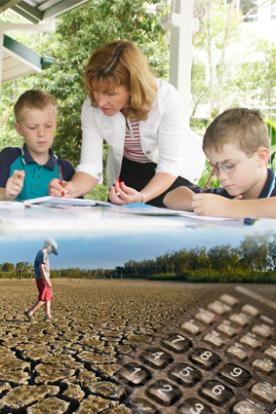
Social and geographical location and its impact on mathematics teaching and learning (2012–2014)
Australian Research Council Discovery Grant
Robyn Jorgensen and Tom Lowrie
A large section of the Australian population underachieves in mathematics, with a strong correlation between the low social background/rural location with underachievement. Too many students from poor urban backgrounds or from rural communities are at risk of under-performing in school mathematics. This project identifies the critical factors that contribute to the performance (both low and high) of students from diverse social backgrounds, urban and rural, and seeks to identify and develop improved practices to enable greater access to school mathematics.
We use a mixed-methods approach by employing a comprehensive survey of Australian mathematics teachers, conducting classroom observations and interviews, and reviewing literature and school document.
The outcomes of this project include a profile of the mathematics teaching profession, the identification of classroom practices in specific settings, and a highlight of best practice pedagogies in diverse social and cultural settings within Australia.
School mathematics
School mathematics is a key learning area in education and is an important indicator for success in adult life. Ensuring better access to school mathematics is of national importance.
This project specifically looks at mathematics teachers and their practices and identifies what factors influence the creation of strong learning environments. The aim is to better understand the factors that impact on student learning in mathematics and teacher practices, particularly in relation to social and geographic dimensions.
Key questions
The project will attempt to address the following questions:
- How do the factors of social and geographic location impact on numeracy learning?
- What factors impact on teachers’ capacity to provide quality teaching environment for mathematics learning?
- How do teachers’ identities and beliefs shape their teaching practices for students in low SES and rural contexts? Do teaching practices differ in different contexts—namely in schools of varying socioeconomic and geographic location?
Method
This project is conducted in three phases.
In the first phase, we developed a comprehensive survey for all teachers of school mathematics. The results of this survey will help us build a profile of teachers of mathematics in Australia, and answer the question:
What aspects of a mathematics teacher’s profile (including mathematics background, dispositions, beliefs, qualifications, professional development) best predict the type of school in which they work?
In the second phase, we use a combination of lesson observations and interviews with key personnel to understand the practices used within classroom contexts. We consider two key questions:
- Which pedagogical practices best foster learning engagement with students and promote quality mathematics outcomes across diverse socio-economic settings?
- What, if any, relationships exists between pedagogical practices, learning environments and students’ numeracy performance?
In the third phase, we hope to develop a rich description of mathematics education using the data collected in the previous phases and school documents. We consider:
- What external factors further contribute to our understanding of the practices that shape mathematics teaching and learning?
- Which structuring practices have relative influence (both positive/negative) in the contexts identified in this study?
Our approach will allow us to explore what is typical and atypical in order to better understand what works and what is problematic. Ultimately, we hope to identify best practice pedagogies in diverse social/cultural setting as a way of describing effective and sustainable pedagogies for all students irrespective of social (dis)advantage.
